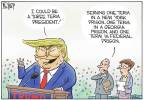Judge OKs at-large caucuses on Strip
Fearing he would set a precedent that affects presidential caucuses across the country, a federal judge refused Thursday to interfere with the Democratic Party’s plans to hold at-large precinct caucuses to accommodate Strip shift workers.
U.S. District Judge James Mahan said political parties have the freedom to set up their own guidelines for caucuses if they do not discriminate against voters based on race, gender or religion.
"They have a right to govern themselves, set up their own rules," Mahan said. "If the Democratic Party said, ‘We’re going to exclude African-Americans, we’re going to exclude women or Jews,’ I would say you’ve got my interest."
Before rendering his decision, Mahan listened for two hours to arguments from the Nevada State Education Association and the state Democratic Party regarding nine at-large caucuses that will operate on or around the Strip.
The teachers union sued the Democratic Party over the at-large caucuses, alleging the formula adopted to choose delegates at the sites dilutes the votes of citizens at fixed precincts.
The union also argued that accommodations were not made for other Las Vegas Valley workers, such as school custodians, whose work schedules conflict with the caucuses.
"I represent the custodians in this case, and they are being disenfranchised," said Lynn Warne, president of the state teachers union. Warne said the many custodians are responsible for opening caucus sites.
Attorneys for the Democratic Party argued that the union’s concerns about the at-large caucus were raised too late. The plan was adopted in October; the lawsuit was filed a week ago.
They rejected the union’s position that the original plan did not outline the delegate-to-voter ratio.
In at-large caucuses, the number of delegates are assigned based on attendance. At fixed precincts, the number of delegates chosen are based on registered voters in each specific area.
At at-large precincts, not only does the number of delegates change based on turnout, but the ratio changes. The lower the turnout, the better the ratio of delegates to caucus-goers.
Attorney Mark Ferrario, who represents the teachers union, said the Democratic Party’s formula could provide one delegate to as few as five caucus participants at the at-large precincts, while the other county caucuses will be assigned one delegate per 50 registered voters.
Ferrario argued that if at-large caucus attendance is low and the participation at fixed precinct sites is high, the at-large participants’ votes will, vote for vote, be more powerful.
He suggested the party quietly changed the ratio formula without proper approval. In the only Democratic Party plan the teachers union saw, all caucuses were assigned one delegate per 50 voters, Ferrario said.
"I don’t think changing the ratio from 50-to-1 to 5-to-1 would be considered minor on anyone’s scale," he said.
The teachers union offered to support at-large caucuses if the 50-to-1 ratio were applied, but the Democratic Party rejected the proposal.
Mahan suggested that Ferrario’s argument was irrelevant, emphasizing that caucuses are not designed to reflect a one person, one vote process.
"This isn’t an election, it’s a caucus," Mahan said.
Attorney Paul Larsen, a member of the Democratic Party’s legal team, said the delegate-selection formula was set forth in the party’s plan that was first introduced in March. The plan, he said, is posted on its Web site.
"Anyone who could read and was engaged in the process could have read what was going on," Larsen said after the hearing. "Just because they didn’t doesn’t make the plan invalid."
Ferrario told Mahan that no transcripts or meeting minutes showed that the caucus plan was approved by the Democratic Party Central Committee, a requirement under the party’s own rules.
"This is according to their own rules," Ferrario said.
Although the Democratic Party never produced evidence of such a vote, Mahan did not appear to give Ferrario’s argument much weight. The judge also rejected Ferrario’s suggestion that state law governs the structure of caucuses and said the law applies to the county and state conventions, not how delegates are chosen.
Critics of the lawsuit contend the teachers union is more concerned about blocking convenient caucus locations for the Culinary union members, most of whom work on the Strip, than providing the same opportunity for other workers throughout the valley.
Opponents of the legal action argue the teachers union had aligned itself with Sen. Hillary Clinton and only raised questions about the process after the Culinary union endorsed Sen. Barack Obama on Jan. 9. The complaint was filed two days after the endorsement was announced.
"That’s the great irony: The group that has aligned itself with Hillary is disenfranchising the same group of workers Hillary complained wasn’t allowed to vote in Iowa. My head is spinning," said Eric Herzik, chairman of the Political Science Department at the University of Nevada, Reno.
About 80 percent of the Culinary union’s 60,000 members work on the Strip. Those union workers represent about half of all employees at Strip resorts and are eligible to caucus at the at-large precincts.
Warne denied that the legal action was taken because of the Obama endorsement.
"This has never been about candidate preference," she said after the hearing.
Mahan’s decision was applauded by the Culinary union and leaders of the Democratic Party.
"We are very, very happy about the results from the court’s decision today," said D. Taylor, the Culinary’s secretary-treasurer. "It’s been very confusing and troubling for our members, but we think now we can concentrate on the guts of the campaign."
When asked whether he thought the lawsuit was fueled by his union’s endorsement, Taylor responded: "The lawsuit came two days after we endorsed Sen. Obama. I’ll just leave it at that."
Mahan’s decision should keep Saturday’s caucuses tight, Bill Burton, Obama’s campaign spokesman, said in a statement. The decision did not appear to stop the two sides from taking last-minute jabs at one another.
"We’re glad that the Nevada court upheld the Nevada Democratic Party’s caucus plan, which encourages voter participation," Burton said. "While the Clinton camp clearly believed the voices of workers should be silenced in service of their perceived political interest, they enjoyed a 25-point lead two months ago and have much of the party establishment in their camp."
A statement from Clinton’s camp encouraged Nevada voters to participate in the caucuses and said that Obama’s team thinks whoever landed the Culinary union’s endorsement would win the state.
"Make no mistake — the current system that inhibits some shift workers from being able to participate, while allowing others to do so, would seem to benefit other campaigns," a statement from Clinton’s campaign said. "More importantly it’s unfair."
Nevada Democratic Party Chairwoman Jill Derby and Clark County Democratic Chairman John Hunt urged the state’s Democrats to reunite and morph into a force to change the country’s administration.
"Some Democrats might have disagreed on the allocation of delegates in this caucus, but this issue is settled and we are unified in our commitment that Nevadans turn out and voice our opinions Saturday to help select our next president," the leaders said in a joint statement.
That the state’s two largest unions are butting heads days before Nevada’s first relevant caucuses has raised concerns. The state’s strong union forces had persuaded the Democratic National Committee to move up the Nevada caucuses and make them relevant.
"This is the type of intra-party fight the Democrats don’t want and can ill-afford," Herzik said. "The Democrats were rolling along and unified."
Union representatives said Thursday they plan to move forward and harbor no bad feelings for each other.
"We never, ever get confused if we have a difference of opinion," Taylor said. "It’s our members’ kids who are in those schools."
"The Culinary and teachers unions have had their differences in the past," said Warne, who downplayed the conflict. "It’s just the way it is."
Although the controversy and battle between unions might play out in Nevada for months to come, some think that the rest of the nation — including the national media that packed the courtroom Thursday — will forget about the caucus debacle.
"Honestly, this will be forgotten so quickly," said Larry Sabato, director of the Center for Politics at the University of Virginia. "That’s the beauty of a 50-state election system, you move so fast to the next venue that almost everything is a one-day story."
Contact reporter Adrienne Packer at apacker@reviewjournal.com or (702) 384-8710.
ELECTION INFORMATION Saturday caucus start time for Democrats is 11 a.m. Republicans will begin caucusing at 9 a.m. Democrats and Republicans who are unsure where they should report for their caucus may visit the parties’ Web sites:• nvdemscaucus.com• nvgopcaucus.com.

















